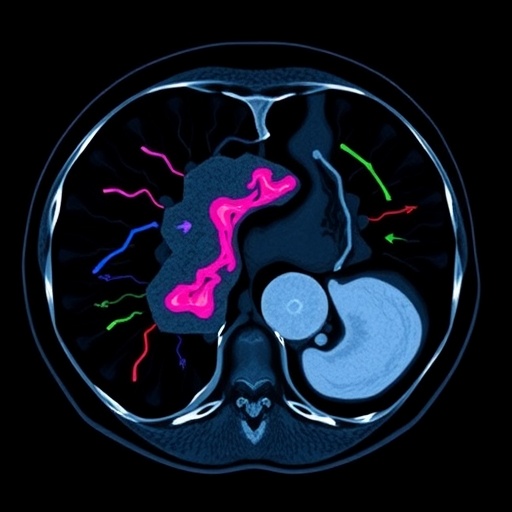Revolutionary Advances in Oncology: The OncoMet Framework for Esophageal Cancer
In a groundbreaking study, researchers have unveiled OncoMet, an innovative deep learning framework specifically designed to enhance our understanding of esophageal cancer. This ambitious project represents a significant convergence of artificial intelligence and medical research, striving to dissect the complex nature of oncogenic signaling pathways and identify patterns that contribute to metastasis. The implications of this research extend beyond basic science, offering potential pathways for improved therapeutic strategies and patient outcomes.
The authors of the study, Aalam et al., emphasized that esophageal cancer remains one of the most aggressive malignancies, often diagnosed at advanced stages, which severely limits treatment options. This cancer type is particularly notorious for its high metastatic potential, and unraveling the intricacies of its signaling pathways could provide pivotal insights into its progression. Current diagnostic techniques often fall short of reliably predicting which patients will develop aggressive forms of the disease, making this research even more essential.
At the core of OncoMet lies a deep learning algorithm that leverages histopathology images captured from primary tumors of esophageal cancer patients. The researchers utilized a robust dataset, encapsulating a wide variety of tumor presentations and histological grades. By training the model on this diverse dataset, the framework enables the identification of subtle features that may correlate with malignancy and metastasis, features that might elude traditional diagnostic methodologies.
Histopathology images serve as a rich source of information, containing a wealth of visual data that can be harnessed to gain insights into tumor biology. Aalam and colleagues meticulously curated these images to create a comprehensive library, subsequently employing advanced image processing techniques to enhance the training of their deep learning model. This process enables OncoMet to discern complex patterns and relationships within the data that are typically beyond the capacity of human observers.
The researchers conducted a series of validation experiments to assess OncoMet’s predictive capabilities. By comparing outcomes between model predictions and actual patient trajectories, they established a robust link between specific histopathological features and the likelihood of metastasis. Such a correlation not only validates the accuracy of OncoMet but also paves the way for its application in personalized medicine. Physicians could utilize the model to tailor treatment plans based on the predicted behavior of an individual’s cancer.
One of the groundbreaking aspects of this research is its potential to shift the paradigm in cancer diagnostics from reactive to proactive. By equipping clinicians with predictive tools, the OncoMet framework could lead to earlier interventions, ultimately improving survival rates for esophageal cancer patients. This proactive approach aligns with the contemporary vision in oncology for a more personalized and responsive treatment landscape.
Moreover, the implications of this research extend into the realm of genomics and proteomics. As OncoMet continues to evolve, it could integrate multi-omic data sets, further enhancing its predictive power. Researchers envision a future where deep learning frameworks like OncoMet not only analyze histopathology images but also correlate them with genetic and molecular profiles of tumors. Such comprehensive models could revolutionize patient stratification, leading to more effective targeted therapies.
The study’s authors insist on the importance of collaborative research in this innovative endeavor. By pooling resources and expertise across various disciplines, they seek to refine the OncoMet framework continually. Interdisciplinary collaboration not only accelerates the pace of advancements but also cultivates an environment where diverse perspectives fuel creativity and innovation. The fusion of technology with traditional medical expertise exemplifies how significant breakthroughs can emerge from such partnerships.
The researchers acknowledged the challenges that lie ahead, including the need for regulatory approval and clinical validation before OncoMet can be integrated into routine clinical practice. However, they remain optimistic about the framework’s future. As the medical community becomes increasingly aware of the capabilities of artificial intelligence, avenues for deep learning applications in oncology will surely expand.
Furthermore, ethical considerations must accompany this technological advancement. As with all applications of AI in healthcare, the principles of transparency, accountability, and fairness need to guide the deployment of OncoMet. Building trust among clinicians and patients is vital for the acceptance of AI-driven tools in clinical settings. Ongoing dialogue about the ethical implications of such technologies will be critical in navigating this transformative era in medicine.
In conclusion, the OncoMet framework marks a pivotal advancement in the fight against esophageal cancer, embodying the intersection of technology and medicine. By harnessing the power of deep learning, the researchers have opened new avenues for understanding oncogenic pathways and enhancing patient outcomes. As the medical community grapples with the challenges posed by aggressive cancers, innovations like OncoMet are not just promising; they are essential for forging a future where personalized oncology becomes the standard of care.
This groundbreaking research underscores the transformative potential of deep learning in oncology. By systematically analyzing historical images and correlating them with clinical outcomes, OncoMet establishes a sophisticated tool that can guide oncologists in making informed decisions. The hope is that such advancements will soon translate into improved patient care and a more profound understanding of one of the most challenging cancers in today’s medical landscape.
As we move forward into an era where deep learning frameworks become integral components of cancer research, we can only anticipate the remarkable breakthroughs that await us. OncoMet is merely the beginning; the future of cancer diagnostics and treatment holds immense promise.
Subject of Research: Deep learning framework for cancer prediction and metastasis assessment.
Article Title: OncoMet: a deep learning framework for the prediction of oncogenic signaling pathways and metastasis in esophageal cancer patients using histopathology images from primary tumors.
Article References: Aalam, S.W., Ahanger, A.B., Majeed, T. et al. OncoMet: a deep learning framework for the prediction of oncogenic signaling pathways and metastasis in esophageal cancer patients using histopathology images from primary tumors. J Transl Med 23, 945 (2025). https://doi.org/10.1186/s12967-025-06914-4
Image Credits: AI Generated
DOI: 10.1186/s12967-025-06914-4
Keywords: Deep learning, oncology, esophageal cancer, histopathology, metastasis prediction, artificial intelligence, personalized medicine.




